26 Foods You Can Consume To Get Naturally Firm And Big Buttocks Fast
Tone and target your glutes with the combined effort of nutritive foods and exercise.
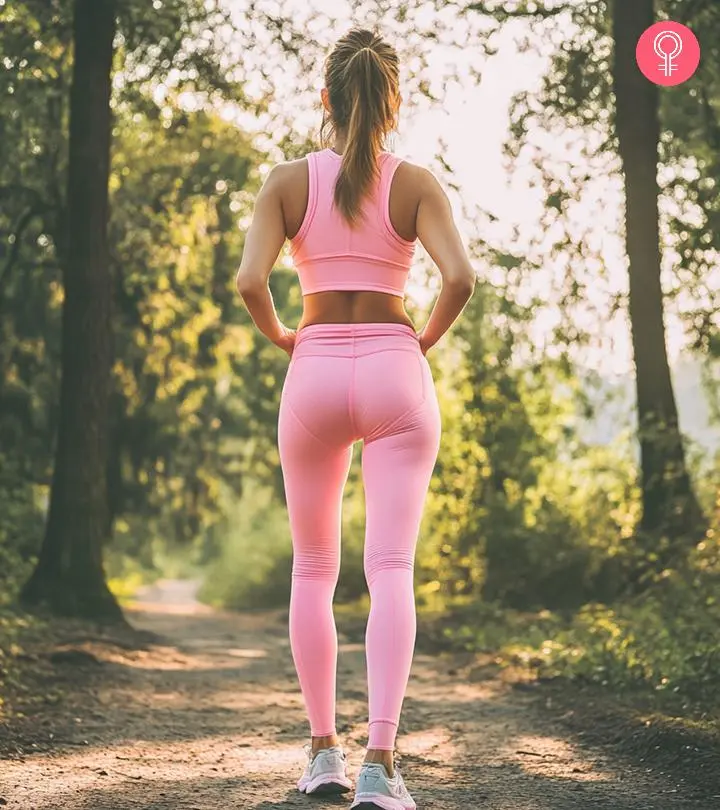
Image: Midjourney/ StyleCraze Design Team
Believe it or not, you can get a rounder, firmer, and bigger butt without implants. But how to gain weight in your butt? Many foods help make your butt bigger. Of course, these foods, along with certain exercises, can help you get a naturally lifted shapely butt. What food makes your butt bigger, you ask? A balanced diet comprising healthy nutrients and muscle-building protein can help you achieve the curvaceous bum of your dreams. Read on to get the full list of 26 foods and a diet plan to build lean muscle in your glutes. Scroll down!
But first, let’s know how these foods help get a bigger butt. Read on.
In This Article
How Can Foods Help You Get A Bigger Butt?
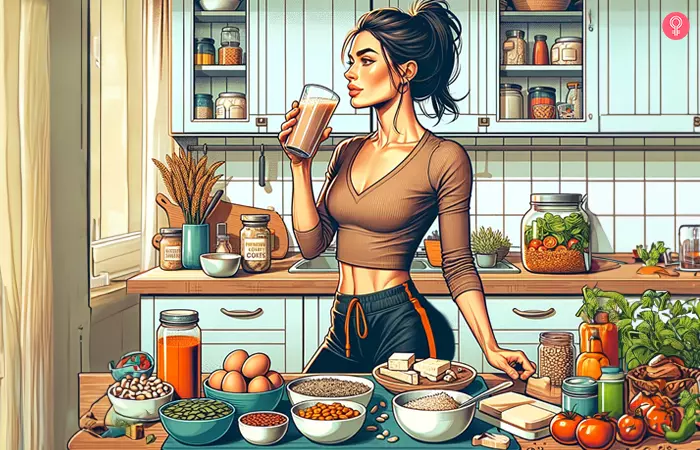
Foods may make your butt bigger by increasing fat and lean muscle mass.
Your butt is made of gluteal muscles (gluteus maximus, gluteus minimus, and gluteus medius) and fat layer. To enhance the appearance of your butt, you not only need to increase the size of the glute muscle but also add a fat layer to make it appear round and shapely. So, if your question is, how to get curvy butt, you are at the right place!
Jesse Feder, Registered Dietitian with a Master’s Degree in Dietetics and Nutrition from Florida International University, says, “Starch-rich foods tend to be higher in calories. This can help add weight to your body and therefore make your butt bigger.”
Fitness blogger Daniella Peters shares a few tips that helped her tone and build her butt in her blog, Daniella Peters Fit. She shares, “It’s so important to eat enough protein when trying to build glutes. You can work out your own protein requirement on free macro calculators online (i).”
Foods rich in protein help increase lean muscle mass, and high-calorie foods help add the fat layer. But that does not mean you may consume junk food! What foods make your butt bigger? Here’s what you must add to your diet.

Key Takeaways
- The intake of protein-rich foods and complex carbohydrates can help add a layer of fat that helps you get a bigger butt.
- Certain foods, such as fish, quinoa, eggs, chicken, and brown rice are vital for muscle building and are recommended for getting big buttocks.
- Fruits, such as avocado and green leafy veggies, such as spinach also adds volume to your buttocks.
26 Foods You Should Consume To Get Big Buttocks
A well-balanced, nutrient-rich diet can help you attain a well-shaped posterior. The following list introduces such foods that can contribute towards your big buttocks journey.
1. Protein Shake
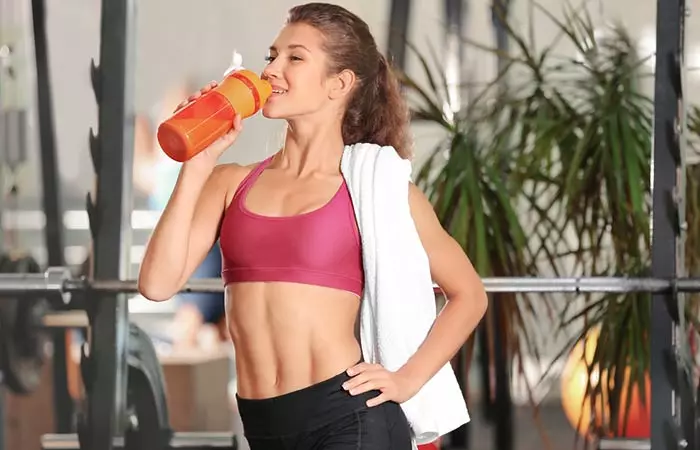
Your body needs at least 1.6 – 1.8 grams of protein per kg body weight per day. Protein shakes come in handy when you cannot get enough protein from whole food sources. They are also useful for those who exercise regularly. Packed with high-quality protein, these shakes help repair and build gluteal muscles after a workout, ensuring faster recovery and improved muscle growth.
According to a study published in the journal Heliyon, individuals who exercised more and had a higher intake of popular protein sources like chicken, eggs, and canned tuna were more likely to consume protein supplements. The 2019 study was based on 916 responses collated from gym users in Italy, Turkey, and UK. 40.2% of Italian, 75.8% of Turkish, and 56.84% of British gym users took a protein supplement in combination with other nutritional supplements.
There are different protein shakes available on the market (including vegetarian and vegan versions). Buy one and add it to water/milk/almond milk and have it 15-20 minutes after your workout session.
2. Chia Seeds
Chia seeds are packed with proteins and healthy fats (1). There are 14 grams of protein in 100 grams of chia seeds. These seeds are super rich in omega-3 and omega-6 fatty acids, antioxidants, and fiber. Thus, chia seeds support muscle repair and growth, essential for building bigger and firmer buttocks.
Add two tablespoons of chia seeds to your breakfast smoothies, pancakes, and juices.
They are easily available and have a neutral taste. So, you can add them to any dish. But do not overconsume them as that might cause stomach ache.
3. Fish
Fishes, both freshwater and marine varieties, are loaded with protein and healthy fats omega-3 fatty acids (2). These nutrients help reduce inflammation and promote muscle development in the glute region. Include salmon, tuna, mackerel, haddock, basa, anchovies, tilapia, Catla cutla, and rohu in your meals to get a good dose of protein.
 Quick Tip
Quick Tip4. Spinach
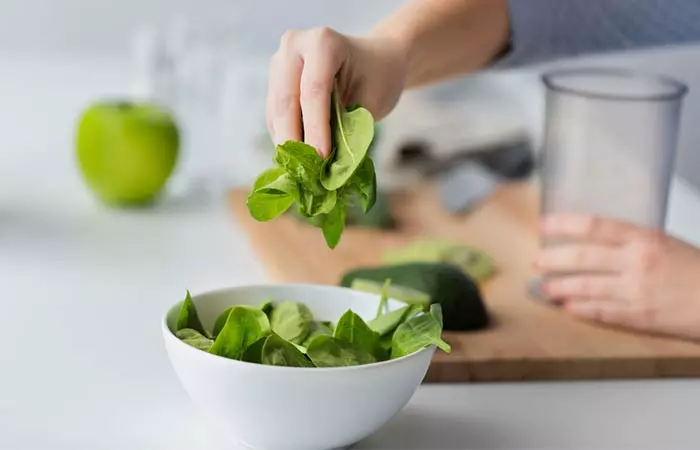
Spinach is a storehouse of vitamins and minerals. It is the best source of iron.
A study published in the journal Food & Function in August 2016 examined the health-promoting properties of spinach. It highlights how spinach-derived bioactive compounds, such as thylakoids and glycolipids, provide antioxidant benefits. The antioxidants help eliminate harmful reactive oxygen species, reduce cholesterol and blood lipid levels, and protect you from chronic diseases. These mechanisms contribute to its protective effects against chronic conditions like cancer, obesity, cardiovascular diseases, and metabolic disorders. The review synthesizes findings from cell culture, animal studies, and human research (3).
Adding spinach to your diet will keep you satiated, which means you will not consume junk food. Junk food will only make you gain weight overall and deteriorate your health.
5. Avocados
The creamy and buttery avocados are great sources of vitamins E, A, B6, and C, protein, and minerals
(4). The healthy fats in avocado help reduce inflammation in the body and reduce muscle wear and tear.
You can have half an avocado with eggs for breakfast or add it to salads, wraps, and sandwiches.
6. Flaxseeds
Flaxseeds are loaded with healthy fats and protein (5). This makes them great for promoting muscle repair and providing sustained energy during workouts targeting the glutes. A teaspoon of ground flaxseeds contains about 1.5 grams of protein.
Their color ranges from golden to brown, and they are mostly consumed in the ground form.
Add one to two teaspoons to smoothies, juices, soups, and salads to make your meals extra proteinaceous.
7. Eggs
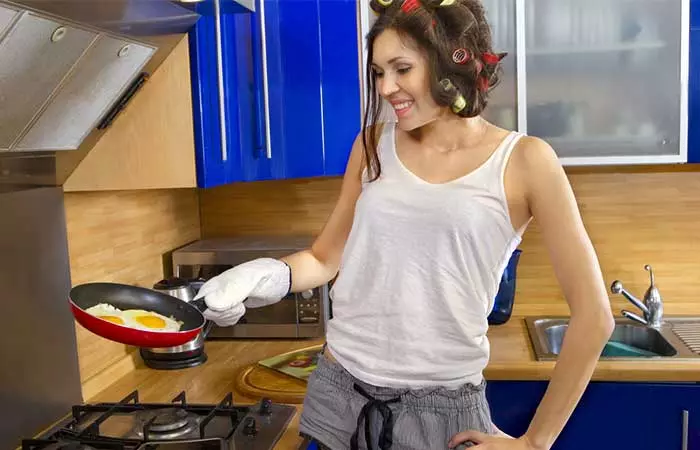
Eggs are great for building bigger and firm buttocks. Whole eggs contain various essential amino acids and both water-soluble and fat-soluble vitamins that help rebuild the muscles and strengthen the muscles (6). A medium egg has about 6 g of protein.
Consume 2-3 whole eggs per week. Avoid the yolk if your cholesterol level is high and your doctor has advised against it.
8. Legumes
Legumes are great sources of protein, vitamins, and minerals. They are also dietary fiber-rich foods (complex carbs), which is essential for maintaining an energy balance in the body (7).
Consume lentils and beans like yellow lentils, whole lentils, red, green, and black lentils, kidney beans, garbanzo beans, peas, and snap peas.
9. Mushroom
Mushrooms are rich in protein and a good option for all vegetarians and vegans. Hundred grams of white mushroom contains 29 calories and provides 3.3 grams of protein (8).
Add them to soups, salads, sandwiches, or wraps to have a delicious and protein-rich meal.
10. Lean Ground Beef
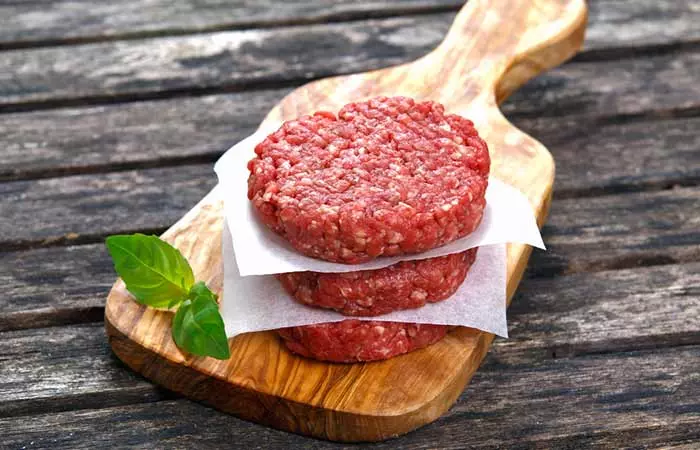
Beef may not be heart-friendly, but there are lean ground beef options available. And they are loaded with protein – 4 oz of lean ground beef can provide you with 28.61 grams of protein (9).
Make cutlets or meatballs or add them to soups to make your meals exciting and nutritious.
11. Tofu And Soy Chunks
Soy products like soy milk and soy chunks are great sources of plant-based protein.
Soy milk turned to cottage cheese results in tofu. There are 8 grams of protein in 100 grams of tofu. And 3.5 oz of soy chunks contains a whopping 54 grams of protein.
Add tofu and soy chunks to salads, sandwiches, wraps, and curries.
12. Cottage Cheese
Soft and white cottage cheese is yummy and a great source of protein – 100 grams contain about 11 grams of protein. It is made from milk and is also rich in calcium.
Like tofu, you can add it to your sandwich, curries, salads, and wraps.
 Quick Tip
Quick Tip13. Quinoa
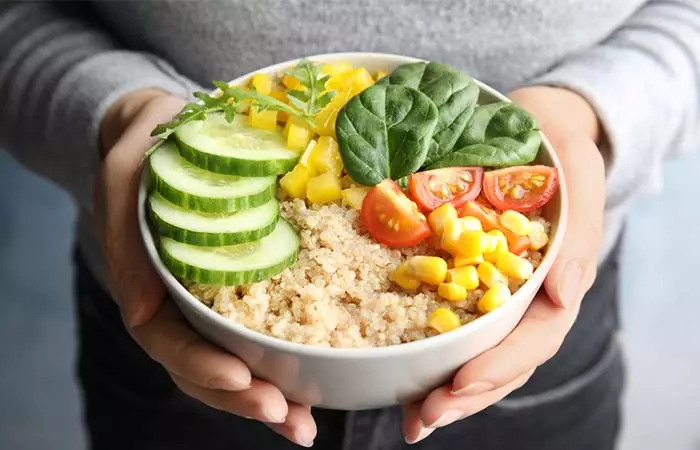
Quinoa is a pseudocereal that is loaded with essential amino acids like tryptophani A type of amino acid found in food that aids in child development, regulating the body’s protein, and maintaining muscle health. , methioninei An amino acid containing sulfur is found in dairy products, meat, and fish. Aids in the metabolic processes of the body. , cysteinei A type of sulfur-containing amino acid found in keratins and other proteins. Essential for nail, skin, and hair health. , tyrosinei A type of amino acid that is essential in the production of crucial hormones and brain chemicals. , valinei An amino acid that is a part of animal and human protein. It aids in muscle tissue growth and repair and improves energy levels. , lysinei A primary amino acid essential for a healthy immune system and calcium absorption. Also plays a vital role in collagen formation. , iso-leucineii A type of amino acid mostly found in animal proteins that is beneficial in boosting immunity and metabolism. , phenylalaninei A kind of amino acid found in plant proteins that offers neurological benefits such as producing neurotransmitters. , and histidinei A type of amino acid that plays a crucial role in iron binding in hemoglobin. Also helps in muscle tissue repair and recovery. . A cup of cooked quinoa contains 5 grams of protein and 8 grams of dietary fiber (10).
Apart from keeping you full for a long duration, quinoa also helps rebuild and rejuvenate your muscles.
Make quinoa salad, quinoa rice, and quinoa soup to make a healthy and tasty meal.
14. Meat Steak
Meat steaks are great sources of animal protein, vitamins B12 and B3, and the minerals iron, phosphorus, and potassium. If you work out regularly and have been working extra hard on those glutes, you do need a protein backup. Meat steaks will do that for you.
15. Milk
Go for full-fat milk if you are trying to get a round and shapely butt. Not because it helps you gain weight, but quite the opposite.
A study published in the journal Preventive Medicine Reports in July 2017 looked at how drinking full-fat milk might affect severe obesity in three-year-old Latino children, a group at higher risk for obesity.
Researchers collected dietary information and measured the height and weight of 145 mother-child pairs from a San Francisco cohort in 2006–2007. They found that children with severe obesity consumed less milk fat (5.3 g compared to 8.9 g) and were less likely to drink milk at all (79% versus 95% of non-obese children). The study showed that higher milk fat intake was linked to lower chances of severe obesity (11).
Therefore, full-fat milk is good for weight loss. The protein and calcium in milk help build lean muscle mass and strong bones, both of which are necessary for achieving the goal you are aiming at.
16. Chickpeas
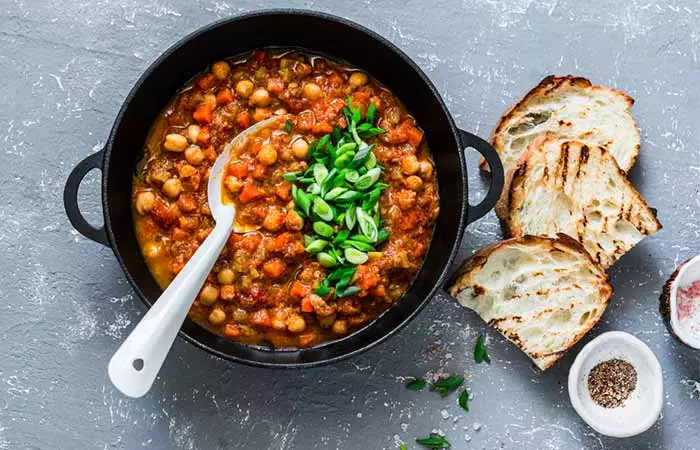
Chickpeas or garbanzo beans are amazing sources of plant protein, dietary fiber, monounsaturated fats and polyunsaturated fats, folatei A nutrient found in the vitamin B9, also called folic acid. Essential for the formation and maintenance of cells. , iron, and phosphorus (12). You get about 18 grams of protein if you consume half a cup of garbanzo beans.
Add them to salads and curries or make hummus.
17. Brown Rice
Brown rice has a thin layer of the outer covering, the bran. The bran is loaded with dietary fiber (13). Though there is nothing wrong in choosing to eat white rice (eat it with lots of veggies), brown rice is more filling, and you also reap the benefits of dietary fiber.
It is very helpful in giving your body the fuel needed to sustain muscle mass while doing butt workouts.
18. Sweet Potato
Sweet potatoes taste great when they are boiled, mashed, and consumed with other veggies. They are loaded with good carbs, antioxidants, and minerals and are perfect for a comforting after workout meal.
19. Plain Greek Yogurt
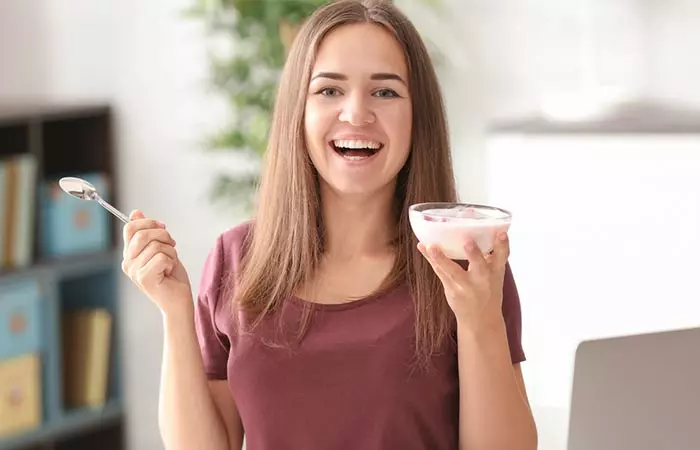
Plain Greek yogurt is a great source of good gut bacteria, protein, and calcium. It helps increase satiety, improves digestion, and supports proper bowel movement (14). Try your best not to splurge on flavored yogurts as they are packed with tons of sugar.
Add it to salad dressings or smoothies or have it as a snack.
20. Pork Tenderloin
A mere 3 ounce serving of pork tenderloin provides 22 grams of protein! Protein is good for building lean muscle mass and improving metabolism.
Have it with a side of salad and yogurt dressing.
21. Hemp Seeds
Hemp seeds are obtained from Cannabis sativa or the hemp plant. These seeds are good sources of omega-3 fatty acids. One ounce of hemp seed contains 161 calories, 9.2 grams of protein, and 12.3 grams of healthy fat.
Grind them and add to smoothies and salads or make a hemp seed energy bar at home to boost your energy right before working out.
22. Dark Leafy Greens
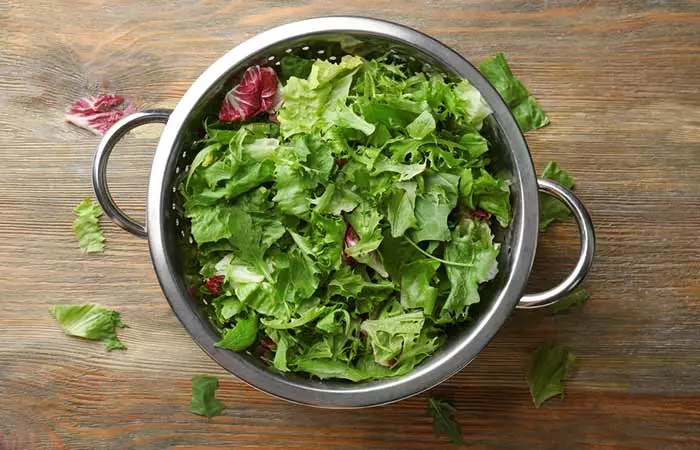
Of course! If you want to lead a healthy and fit life, you must include dark leafy greens in your diet. These are great sources of good carbs and nutrients that will make your meal complete and wholesome and improve your stamina.
23. Almond Butter
Almond butter is a healthier option compared to butter and margarine. It is high in calories and also loaded with healthy fats and protein. You will feel full and not consume junk food to satiate your hunger. As a result, you will not accumulate unwanted fat in your body.
24. Turkey
Like any other meat, turkey is also a rich source of protein. It has fewer calories and saturated fats than other red meat. Go for lean ground turkey if you are concerned about the fat content.
Make kebabs, cutlets, and/or add it to salads and curries.
25. Chicken Breast
Skinless chicken breast is a great source of lean protein. Half a skinless chicken breast contains about 142 calories. It provides you with essential amino acids and keeps your energy levels high.
It can be cooked quickly, is easily available, and you can grill it, make a curry, or add it to a soup.
26. Oatmeal
Oatmeal, a nutrient-dense food, may help you achieve a more defined and toned butt. It is rich in complex carbohydrates and fiber that may support overall muscle development and fat reduction. Oatmeal’s sustained energy release may enhance workout performance, particularly during exercises that target the glute muscles. Additionally, its protein content is said to aid muscle repair and growth. Combining oatmeal with a protein source like Greek yogurt or almond butter can be particularly effective. While oatmeal alone won’t drastically increase buttock size, when integrated into a balanced diet and fitness regimen, it can contribute to achieving a firmer and shapelier appearance over time.
While eating these foods can support overall health and potentially aid muscle growth, it is important to remember that they won’t magically reshape your booty on their own. To see results, you need to combine a healthy diet with targeted exercises that will strengthen and tone the muscles in the buttocks to make them appear firm and big.
For instance, squats, lunges, hip thrusts, and other glute-focused exercises are key to toning and strengthening the buttocks. Remember to be consistent, listen to your body, and enjoy the process!
These are the 26 best foods that you must consume if you are trying to get a bigger butt. Now, let’s take a look at this diet plan that explains exactly how to get a big booty.
Diet Plan For Bigger And Rounder Buttocks
Choosing the right afternoon snacks, such as Greek yogurt with high protein content, can complement a balanced diet focused on fitness goals. Combining these snacks with other nutrient-rich options, including foods that make your butt bigger, like avocados and quinoa, can support muscle growth and help shape your body effectively. Here is a sample diet plan you may try:
| Meals | What To Eat |
|---|---|
| Breakfast (7:30 a.m.) | Oatmeal/quinoa + 1 whole egg + 2 almonds Or A glass (8 fl. ounce) of protein shake + 4 almonds |
| Mid Morning (10:00 a.m.) | 1 cup full-fat milk + 1 digestive biscuit |
| Lunch (12:30 p.m.) | Tuna salad or mushroom salad with flaxseed powder, olive oil, lime, honey, and chili flakes dressing |
| Post-Lunch (3:15 p.m.) | 1 cup green tea + 2 saltine crackers |
| Dinner (7:00 p.m.) | Lentil soup/chicken soup with 1 piece of multigrain bread |
Use this diet as a guide to create your diet using the foods mentioned above. Other than foods, you can also go for Yoga asanas to tone your buttocks. They ensure you eat right and also get in the perfect shape.
Tips For Successful Implementation
Consider the following advice and recommendations to effectively enhance your diet for larger buttocks:
- Pay attention to balanced nutrition and consistency in diet.
- Include lots of protein-rich foods like lean meats, eggs, and legumes to support muscle growth.
- Focus on portion sizes for ample nutrition without overindulging.
- Combine your diet with targeted glute exercises like squats and lunges for firm and toned buttocks.
- Stay hydrated and rest well for a healthy diet journey.
- Monitor your progress and adjust your plan as required to stay on course.
Infographic: Easy Exercises To Tone Your Butt At Home
You can now get the butt of your dreams right from the comfort of your home. While you must keep a close eye on your diet, a strict and effective workout plan is essential, too. It is crucial to achieving a perfectly toned and sculpted lower body. Check out the infographic below to learn which exercises you need to add to your workout regimen.
Some thing wrong with infographic shortcode. please verify shortcode syntax
You can easily get a bigger butt naturally without implants. The butt is made of glute muscles (gluteus minimus, gluteus maximus, and gluteus medius) and fat layer. Foods rich in protein like beef and chicken breast can help increase the lean muscle mass in your butt. On the other hand, high-calorie foods can add the fat layer to your butt and enhance the appearance of your butt. The diet and foods mentioned in this article and basic exercises like squats, lunges, deadlifts with or without booty bands can help you get a naturally lifted shapely butt.
Frequently Asked Questions
How to make your butt bigger in a week?
Glute exercises like donkey kicks, glute bridges, pile squats, hip thrusts, lunges, and cardio exercises such as running, cycling, and brisk walking, and consuming high-protein foods may help you make your butt bigger in a week.
Are there any drinks or supplements that can help increase the size of your butt?
Any claims that a drink or supplement can make your butt bigger are probably false and not supported by reliable scientific evidence.
Does walking make your bum bigger or smaller?
Walking, like any calorie-burning physical activity, can lower your overall body fat, which may result in a smaller butt. It is not a targeted exercise to enlarge or contract your buttocks, though.
Do tomatoes make your bum bigger?
No, tomatoes do not make your butt bigger. Tomatoes are a low-calorie vegetable and do not contain any specific nutrients that can promote butt growth.
Do pumpkin seeds make your bum bigger?
Pumpkin seeds are a good source of protein, healthy fats, and vitamins and minerals like zinc and magnesium. While they cannot significantly alter the size of your buttocks on their own, proper strength training and exercise are necessary along with adequate rest.
So, now you know the secret to how to get a bigger butt fast! Unlock the secrets of growing your glutes with the right foods and exercise. Check this exciting video that reveals the top food choices to help you achieve a bigger and rounder bum.
References
Articles on StyleCraze are backed by verified information from peer-reviewed and academic research papers, reputed organizations, research institutions, and medical associations to ensure accuracy and relevance. Read our editorial policy to learn more.
- Chia Seeds, Harvard T.H. Chan School of Public Health.
https://nutritionsource.hsph.harvard.edu/food-features/chia-seeds/ - Omega-3 fatty acids EPA and DHA: health benefits throughout life, Advances in nutrition, US National Library of Medicine, National Institutes of Health.
https://www.ncbi.nlm.nih.gov/pubmed/22332096 - Functional properties of spinach (Spinacia oleracea L.) phytochemicals and bioactives, Food & function, US National Library of Medicine, National Institutes of Health.
https://pubmed.ncbi.nlm.nih.gov/27353735/ - Hass Avocado Composition and Potential Health Effects, Critical reviews in food science and nutrition, US National Library of Medicine, National Institutes of Health.
https://www.ncbi.nlm.nih.gov/pmc/articles/PMC3664913/ - Nutritional value and functional properties of flaxseed, Vopr Pitan, US National Library of Medicine, National Institutes of Health.
https://pubmed.ncbi.nlm.nih.gov/22888664/ - ASSAYED EGG NUTRIENTS, American Egg Board.
https://www.incredibleegg.org/professionals/manufacturers/technical-resources/nutrient-composition-tables/?site=a - The potential health benefits of legumes as a good source of dietary fibre, The British journal of nutrition, US National Library of Medicine, National Institutes of Health.
https://pubmed.ncbi.nlm.nih.gov/19825218/ - Mushrooms—Biologically Distinct and Nutritionally Unique, Nutrition today, US National Library of Medicine, National Institutes of Health.
https://www.ncbi.nlm.nih.gov/pmc/articles/PMC4244211/ - Lean Ground Beef, Fatsecret.
https://www.fatsecret.com/calories-nutrition/generic/ground-beef-lean-cooked?portionid=3369&&portionamount=4.000 - Quinoa, Harvard T.H. Chan School of Public Health.
https://nutritionsource.hsph.harvard.edu/food-features/quinoa/ - Full fat milk consumption protects against severe childhood obesity in Latinos, Preventive medicine reports, US National Library of Medicine, National Institutes of Health.
https://www.ncbi.nlm.nih.gov/pmc/articles/PMC5552381/ - Chickpeas (Garbanzo Beans), Harvard T.H. Chan School of Public Health.
https://nutritionsource.hsph.harvard.edu/food-features/chickpeas-garbanzo-beans/ - Phytochemical Profile of Brown Rice and Its Nutrigenomic Implications, Antioxidants, US National Library of Medicine, National Institutes of Health.
https://www.ncbi.nlm.nih.gov/pmc/articles/PMC6025443/ - Low, moderate, or high protein yogurt snacks on appetite control and subsequent eating in healthy women, Appetite, US National Library of Medicine, National Institutes of Health.
https://pubmed.ncbi.nlm.nih.gov/23022602/
Read full bio of Merlin Annie Raj
- Isabella Bazzaro, RD, is a registered dietitian with 3 years of experience. She is passionate about helping people live long and healthy life by making smart food choices. After graduating from the University of Miami with a degree in nutrition science, Isabella began to offer her services to hundreds of South Florida clients.
 Isabella Bazzaro, RD, is a registered dietitian with 3 years of experience. She is passionate about helping people live long and healthy life by making smart food choices. After graduating from the University of Miami with a degree in nutrition science, Isabella began to offer her services to hundreds of South Florida clients.
Isabella Bazzaro, RD, is a registered dietitian with 3 years of experience. She is passionate about helping people live long and healthy life by making smart food choices. After graduating from the University of Miami with a degree in nutrition science, Isabella began to offer her services to hundreds of South Florida clients.
Read full bio of Ravi Teja Tadimalla
Read full bio of Payal Karnik







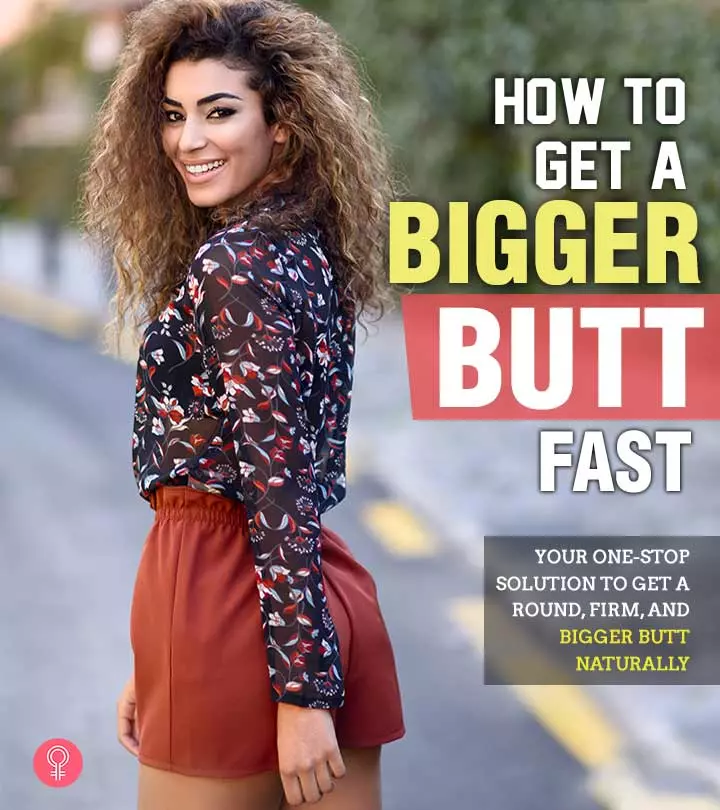

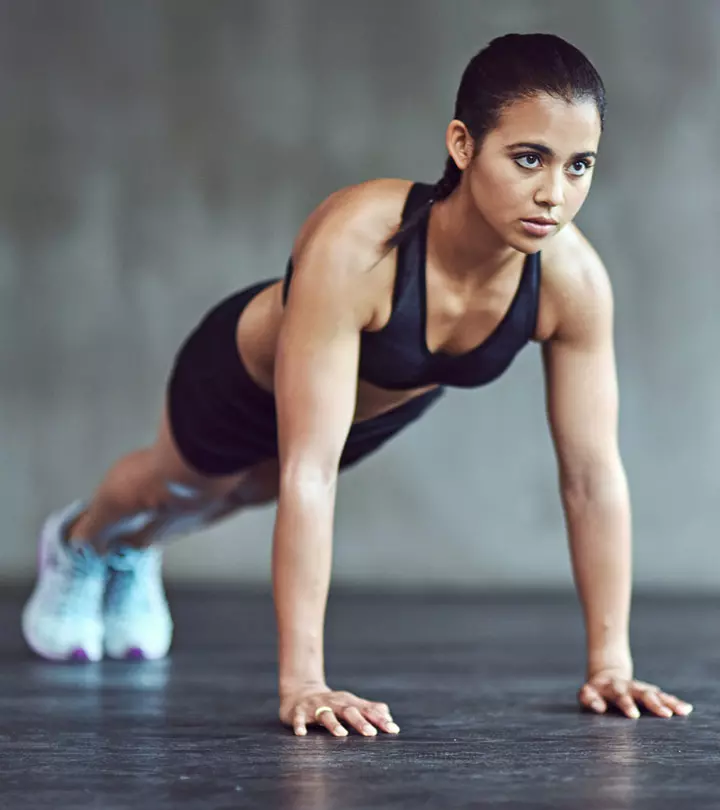
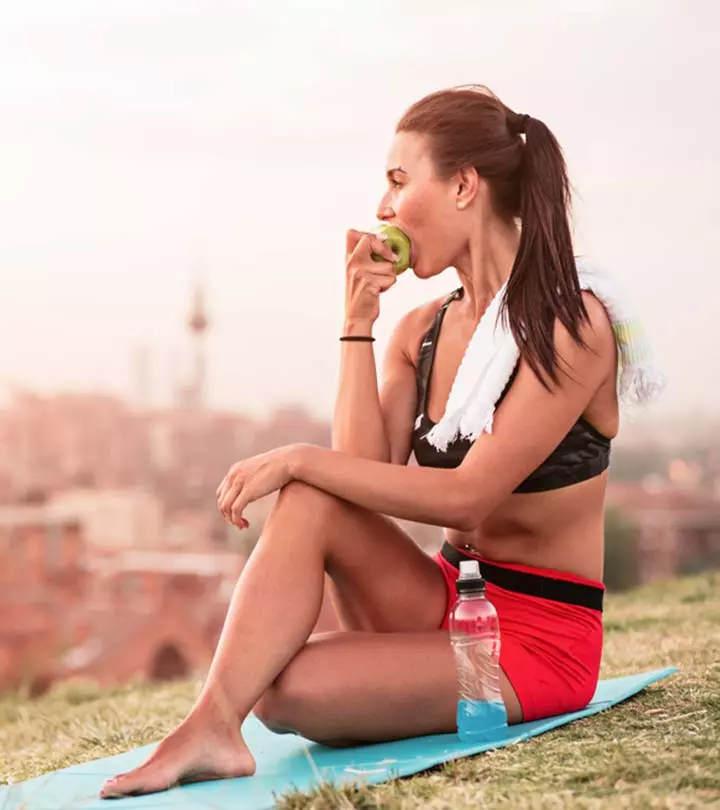
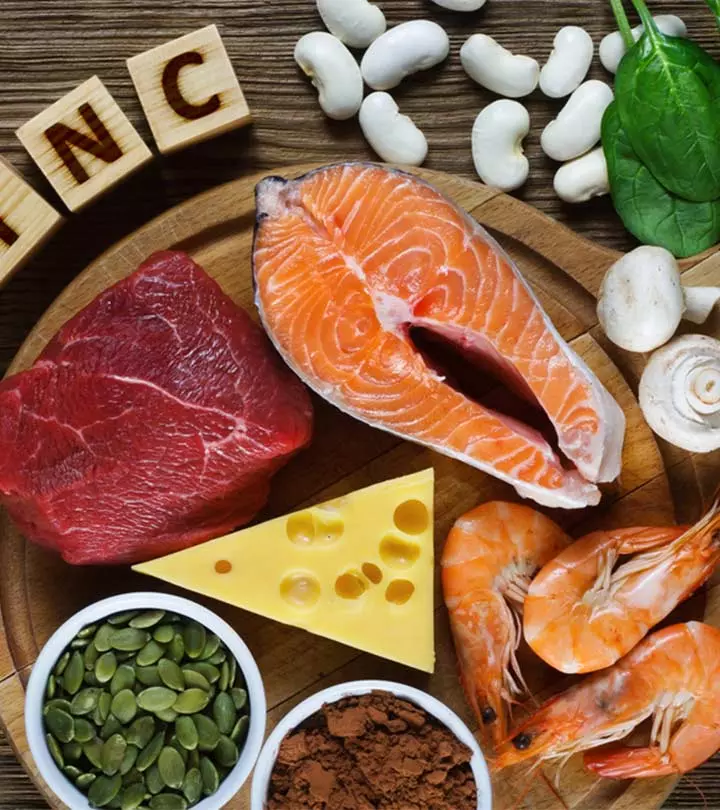
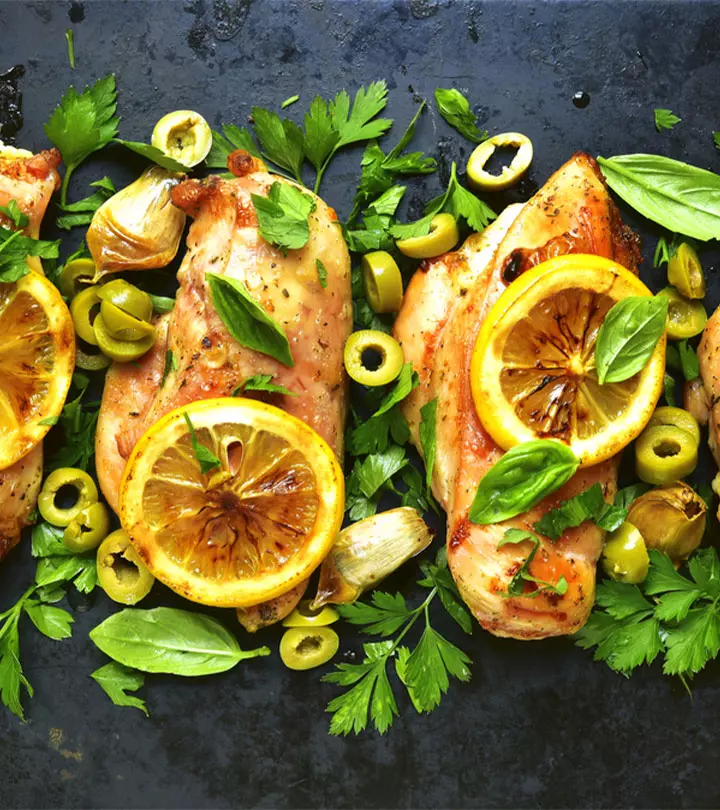
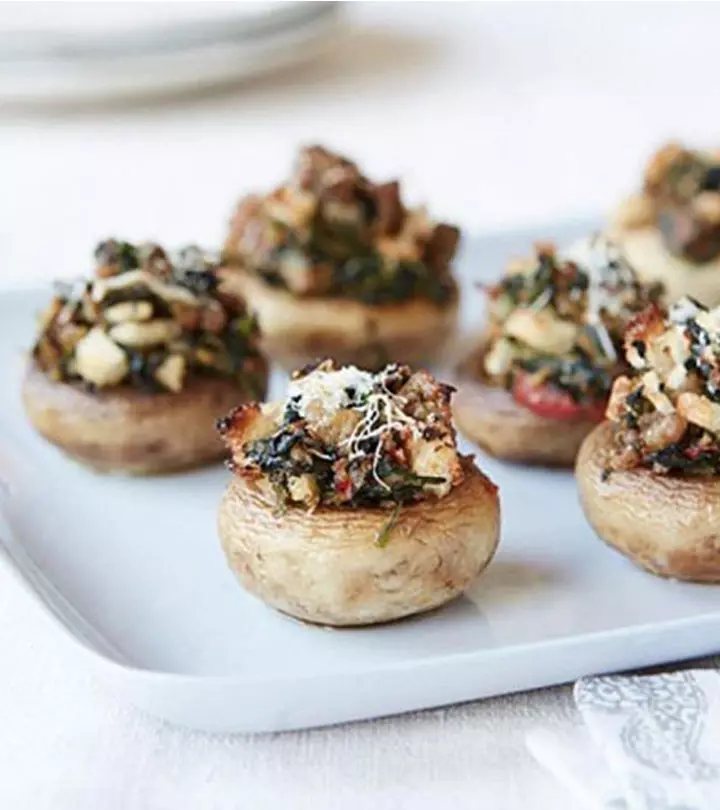

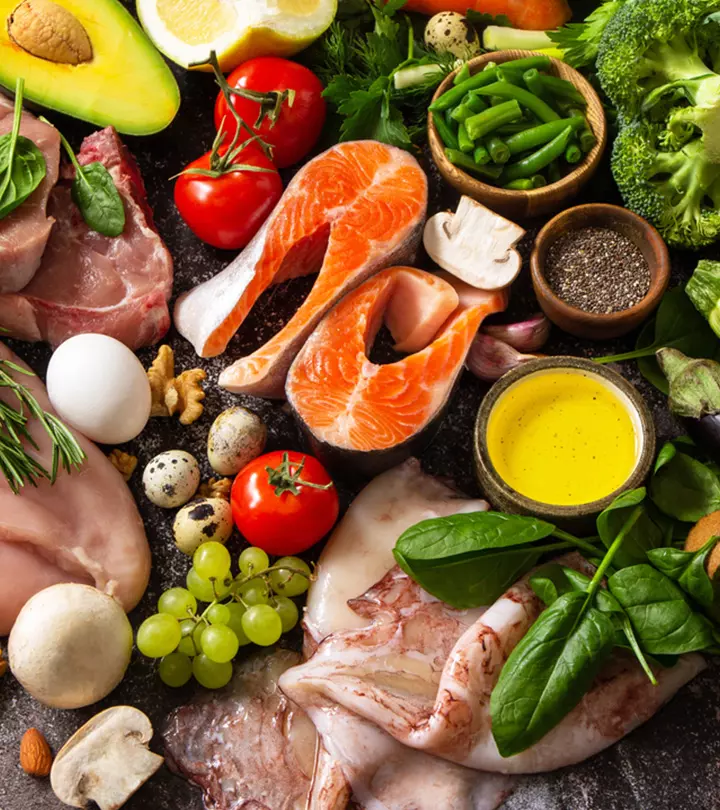
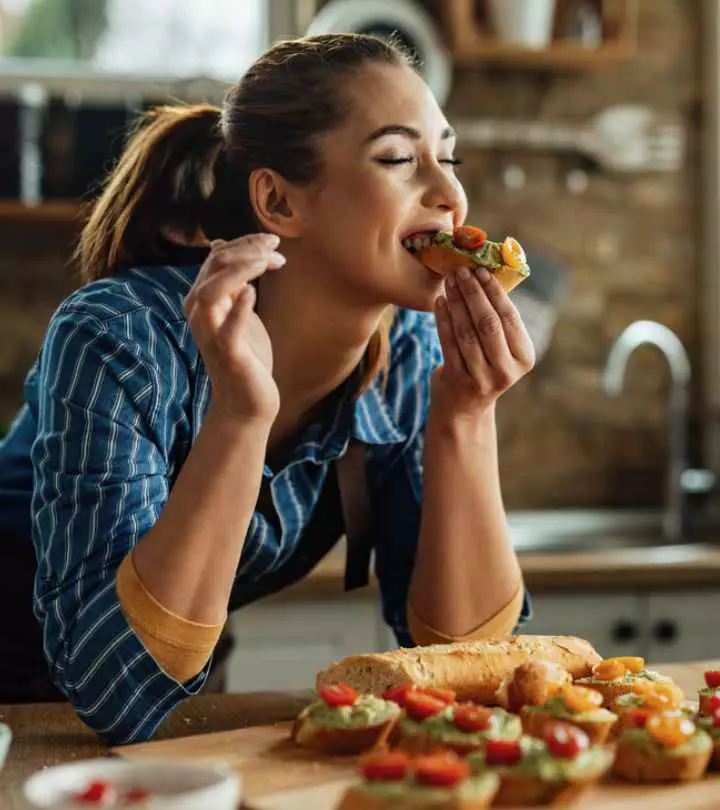
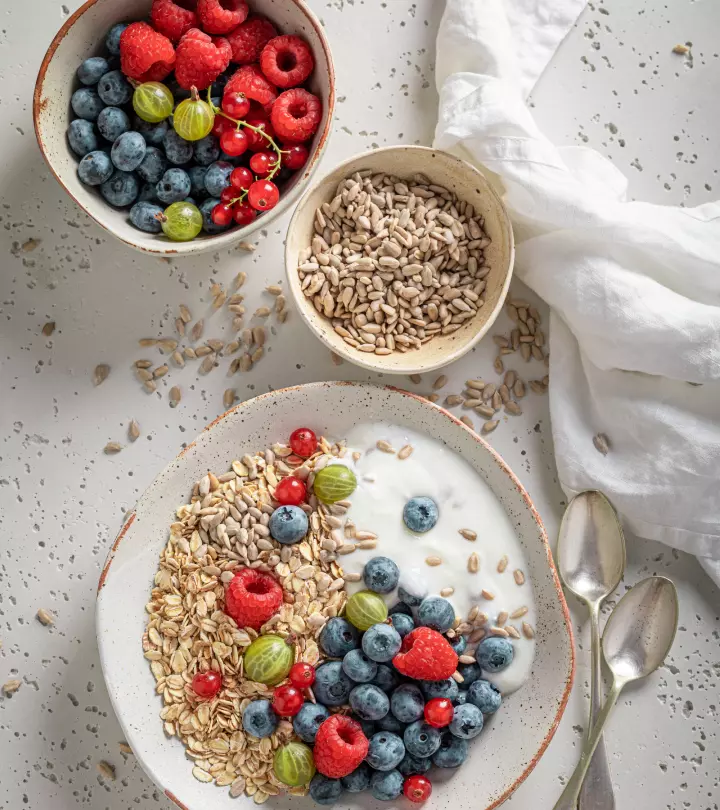

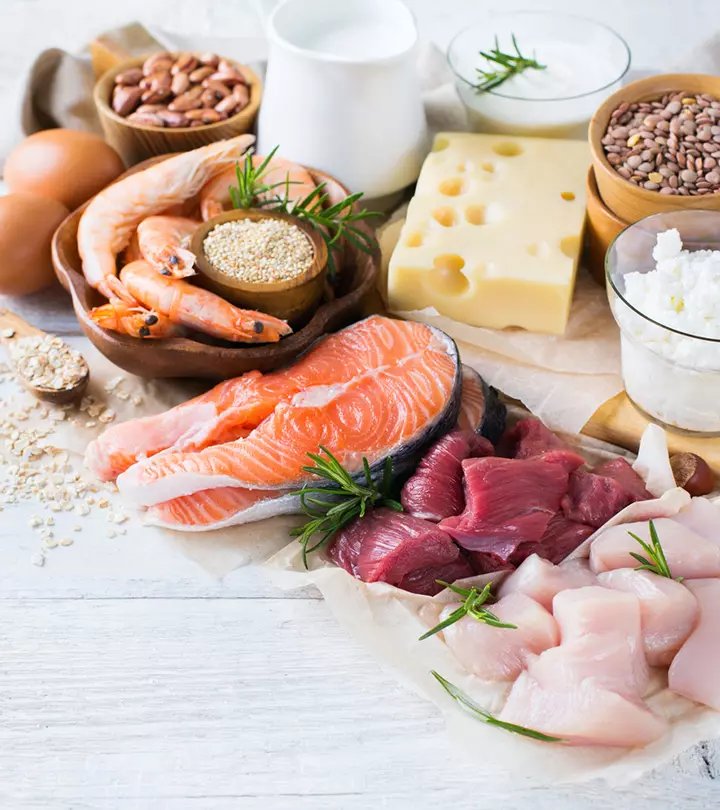
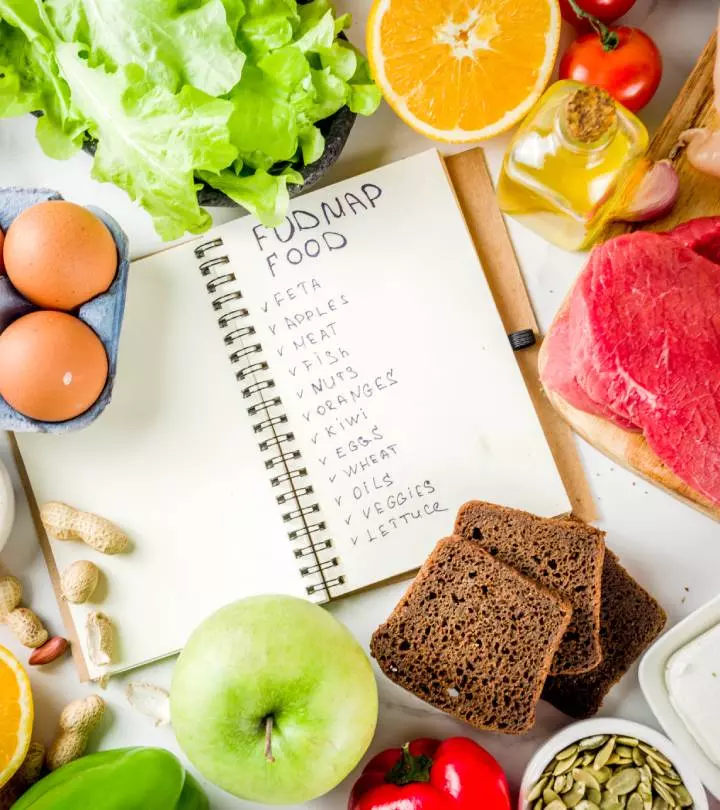
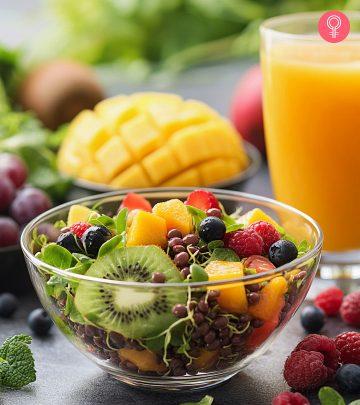
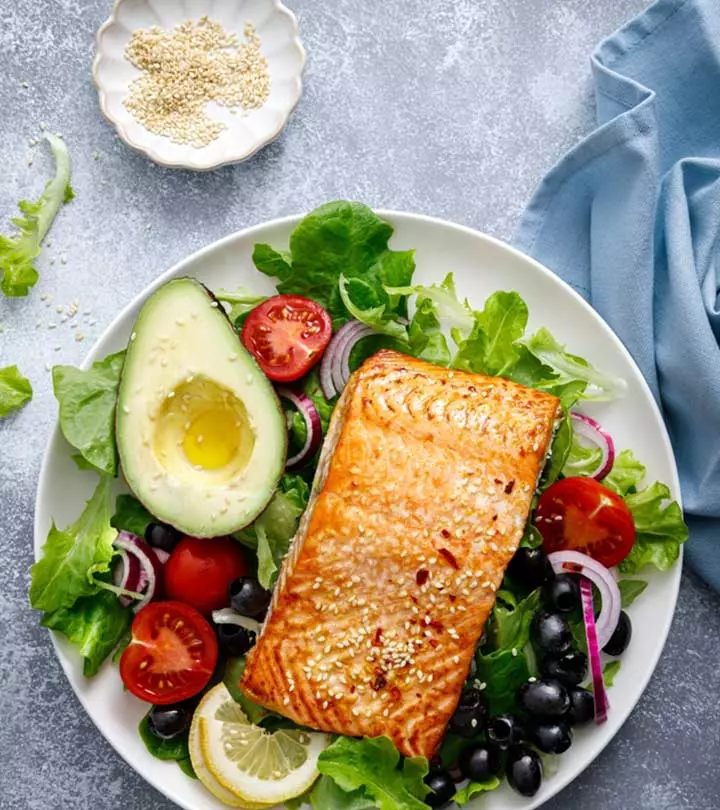

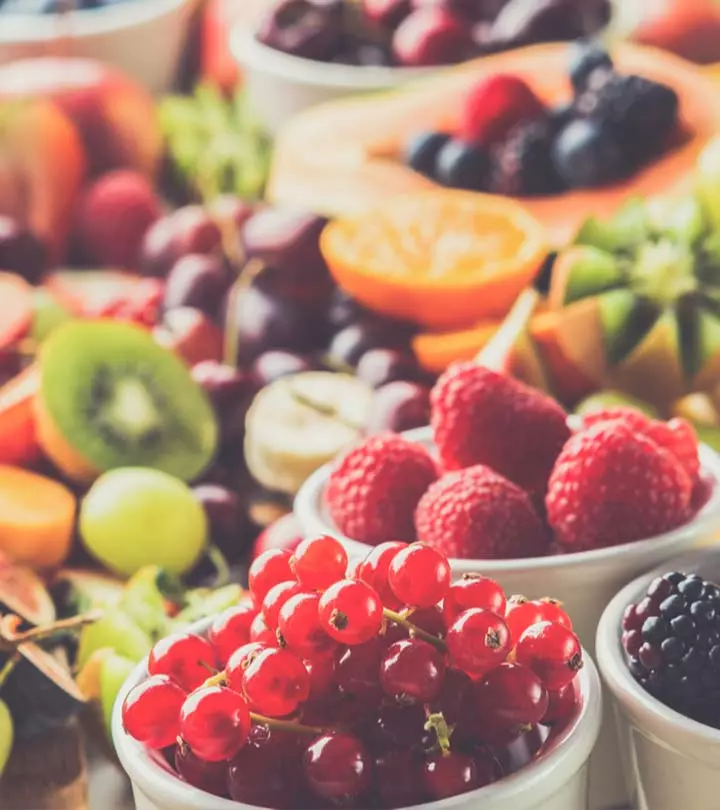
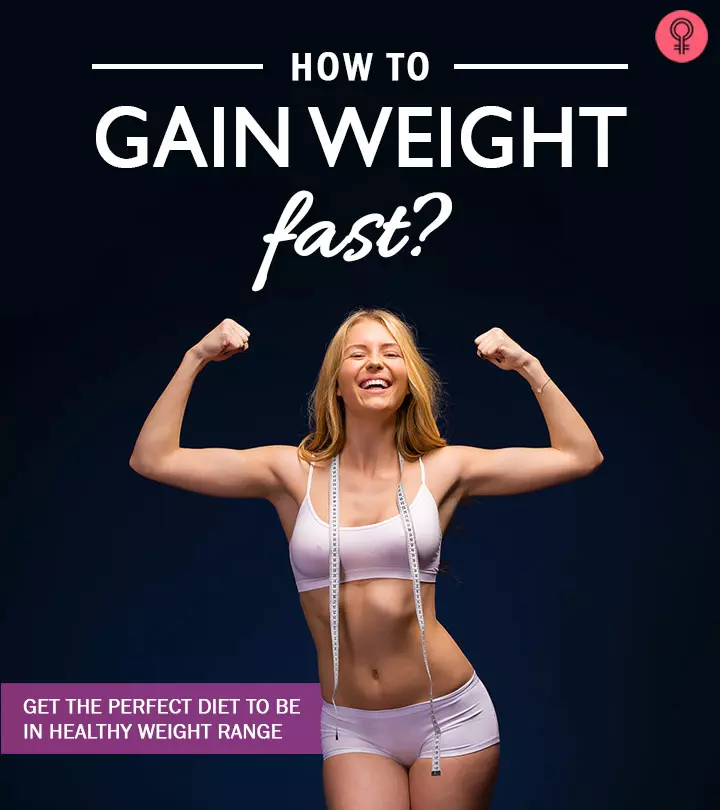
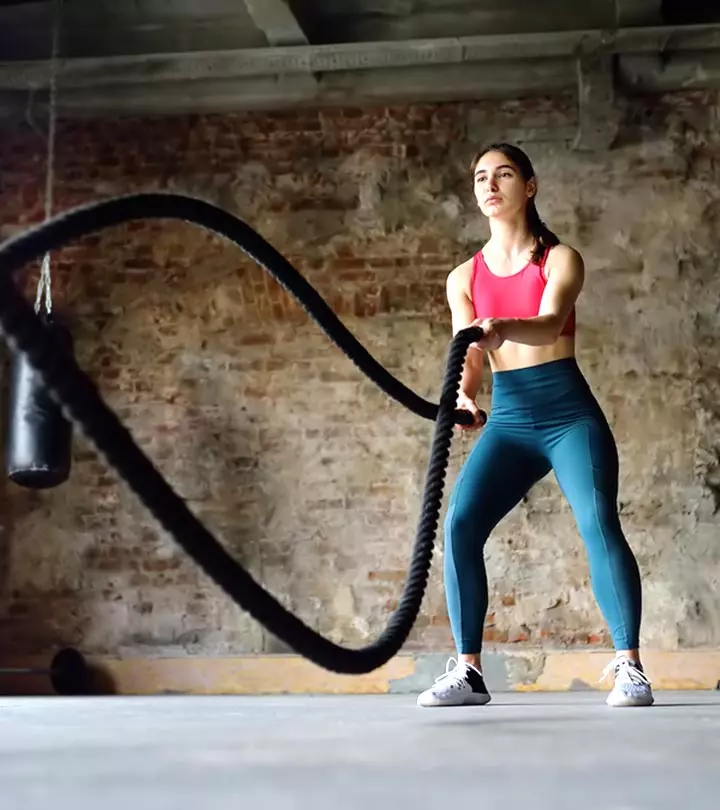
Community Experiences
Join the conversation and become a part of our empowering community! Share your stories, experiences, and insights to connect with other beauty, lifestyle, and health enthusiasts.